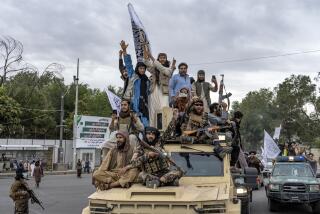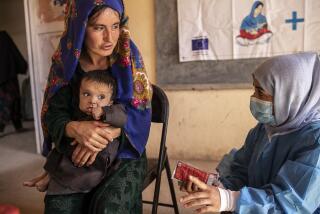Afghan Government Workers Demand Months of Back Pay
- Share via
KABUL, Afghanistan — In an indication of the dire financial straits facing Afghanistan, hundreds of government employees who have not been paid in months took to the streets of downtown Kabul on Tuesday to demand their back wages.
The rare public protest drew as many as 300 workers, who gathered in front of the Ministry of Culture and Information seeking their salaries, which in most cases amount to just $34 a month.
“Worse than not being paid is that the government now says it will lay us off, because there already are too many workers,” said Abdul Muqeem, 43, an employee in the Transportation Ministry. Nodding in agreement nearby was Khalil, a soldier who hasn’t received his $30 monthly wage since February and now faces the loss of his job as the country works to revamp its army.
Officials in President Hamid Karzai’s administration acknowledged Tuesday that the country is acutely short of cash and has not completely met its payroll in three months.
In an interview, Deputy Finance Minister Abdul Salam Rahimy said Afghanistan is not receiving all the international aid that it has been promised. “The donor countries’ money is coming very slowly; practically, this money hasn’t come to Afghanistan this year,” he said.
Making matters worse, what little revenue the country should generate internally is being hoarded by regional warlords, who are collecting the bulk of the nation’s customs duties and taxes. That problem is a source of growing friction between Karzai and provincial leaders.
In addition to struggling with a cash shortage, the government has been slow to disperse wages because it is still figuring out who on its vast, outdated payroll list legitimately deserves to be paid, said Aidan Cox of the Afghan Assistance Coordination Authority, a multinational group set up to help Afghanistan with its finances.
“It’s not all about the financial gap. It’s about putting a payroll system in place and refining information. The government has come a long way, but it’s not there yet,” Cox said.
But none of this matters much to Muqeem, who said he and his family are going hungry.
“We don’t care where the government gets the money from,” he said. “We will continue our demonstrations. Our colleagues in the office have gone on a hunger strike.”
Tuesday’s midday demonstration took on an anti-foreign tone as speakers vented anger over the lack of jobs and reconstruction projects since a U.S.-led coalition drove the Islamic fundamentalist Taliban regime from power in late 2001.
“There are 36 countries allegedly here to help Afghans. But we’d be better off with 36 dogs; then there would be peace in the country. With 36 cows, at least there would be milk. If we had 36 cats, all our mice at least would have been annihilated,” said Mohammed Sediq Afghan, a mathematics professor at Kabul University.
Emerging from 23 years of warfare and anarchy, Afghanistan will need years to get on its feet financially. In the meantime, it will be dependent on international donors to get by.
For the 15 months that ended in March, international donors delivered $1.9 billion of the $2.1 billion in grants they pledged at a Tokyo conference in January 2002. At another donor meeting in Brussels this March, about $1.9 billion was pledged to Afghanistan for the 12 months that began that month.
On a per capita basis, the funds pledged to Afghanistan have been low compared with past international aid efforts to crisis-stricken countries. According to Cox’s group, disbursements to Afghanistan last year equaled $64 per person, while aid to East Timor amounted to $195 per person per year from 1999 to 2001, and Serbia’s Kosovo province received $288 per person per year from 1999 to 2001. In Rwanda in 1994, per capita donations equaled $193.
The money that Afghanistan has received has been stretched thin as more than 2 million people who had fled the country returned last year. Some funds that had been allocated for government operations and infrastructure ended up going to emergency relief for the returnees.
Moreover, Karzai’s administration overestimated the amount of customs duties and taxes it could collect. It had budgeted $460 million for operations last year, but he had to spend $80 million less.
The government’s main hope in getting a better grip on its finances lies in a plan to disarm local militias in the coming year and put its new national army and national police force in place to control border crossings and tax collections.
“We will tell the provinces from now on to send the money they collect to us first, and they will be given what they need by the central bank,” Rahimy said.
*
Kraul is a Times staff writer and Murshed is a special correspondent.
More to Read
Sign up for Essential California
The most important California stories and recommendations in your inbox every morning.
You may occasionally receive promotional content from the Los Angeles Times.












